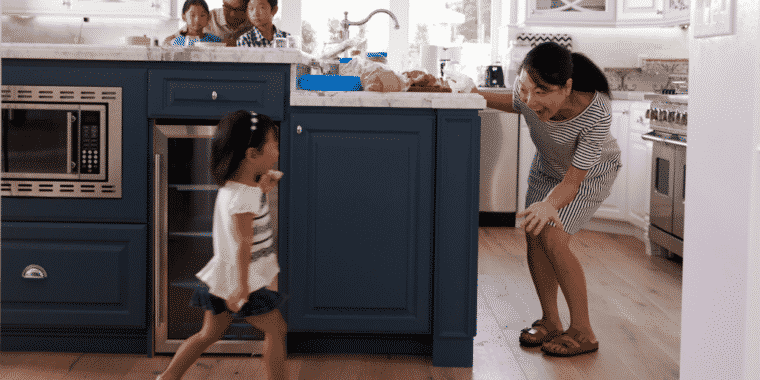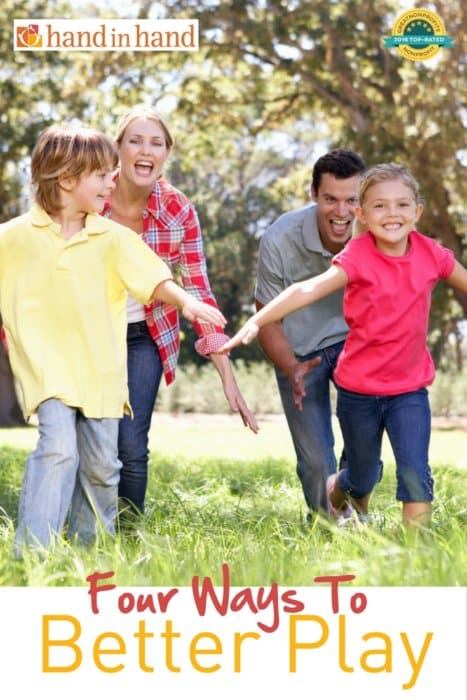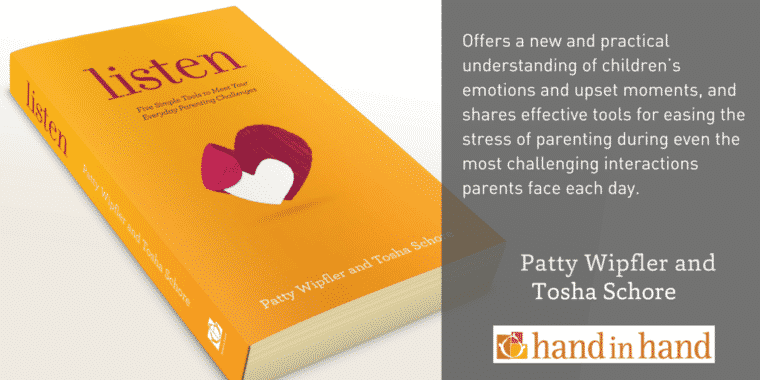Why do your children play well for hours some days and others can't go five minutes without calling on you?
Your own tension may play a big factor. Children have a way of picking up on stress, whether or not you bring it to them. If you are worried, upset or anxious, they might be able to sense it and you'll see the signs fast:
- Whining
- Violence, like hitting or throwing toys
- Using taboo words
- Resisting requests
- Teasing
If you notice an uptick in these kind of behaviours, it's a good time to ask, “Wanna play?”

After recent disruptions, long time preschool teacher Geri Celi noticed a lot of kids in her class were acting up. They'd absorbed tensions from home and came to school burdened with them.
Luckily Ms. Celi is a master of play, and used it quickly to diffuse the tension.
“I'll try and shift the energy around,” she says. “If I'm sat cuddling a toy kitty, I'll say, “You aren't going to try and take this kitty are you?”
Those words are generally enough to spark a game of hide-and-go-seek with the toy, or some kind of tug of war. Pitching the children together against an adult gives them a sense of shared purpose and squabbling stops as they unite. As play continues, tensions get forgotten as laughter takes over.
Why Play Works
Play works to diffuse tension because laughter shifts children from the fight or flight mode that their brains enter under stress. In that state, they find it hard to reason and articulate. Play cuts through that barrier and helps them release those pent up worries.
Ms. Celi, and other play specialists like her have some guidelines to get the best out of play. Here are four ways to better play:
How to Play Better: Four Tips
 Join in: Without a doubt this is the number one call for good play. When children play they exercise the issues relevant to them in that moment. They take the adult role, they practice (or imagine) new skills. This can range from preparing snacks in the play kitchen to banishing the adult to jail. When you play alongside them, you join this journey and your connection grows.
Join in: Without a doubt this is the number one call for good play. When children play they exercise the issues relevant to them in that moment. They take the adult role, they practice (or imagine) new skills. This can range from preparing snacks in the play kitchen to banishing the adult to jail. When you play alongside them, you join this journey and your connection grows.
During play parents can gain valuable insights into how their child sees the world, or what's affecting them because they are far more likely to voice their thoughts in the safety of play than when a parent simply asks about a problem.
And a parent doesn't have to discuss any o f the issues. By playing, children are working on their own issues.
As Lawrence Cohen says in his book Playful Parenting, “Children don't say, “I had a hard day at school today, can I talk to you about it?” They say, “Will you play with me?
Let Them Win: One of Hand in Hand Parenting's five essential parenting tools is called Playlistening, where the child takes the lead in play. Connections and trust get stronger between an adult and child when a child is allowed to take the lead. How does this look? If a child pushes a parent, they can fall over comically, or during a chase game, the parent can flail around until their child catches them. The basic guideline is “follow the laughter.”
There's usually so little time for a child to exercise their strength and power in the day-to-day routine that they often try when parents make requests or need their children to do something. Play allows them a real avenue to reign supreme and let off steam.
 Get Physical: Physical games, from roughhousing to chase, are fantastic to work off extra stress, says Ms. Celi, and fantasy games let kids exercise their imaginations. This is their chance to step into roles that can be scary or violent to them, like prison games or shoot 'em ups.
Get Physical: Physical games, from roughhousing to chase, are fantastic to work off extra stress, says Ms. Celi, and fantasy games let kids exercise their imaginations. This is their chance to step into roles that can be scary or violent to them, like prison games or shoot 'em ups.
Celi likes to bring some extra laughter into these situations using the occasional prompt: “If I'm ‘in prison,' I'll say, “Oooh. I love spaghetti. Will you bring me spaghetti?”
To which they almost always “No!” she says.
The children are thrilled about being the ‘bad guy' or the ‘meanie' while an adult begs and pleads.
Get Consent: If play takes an unexpected turn ask everyone involved if they are still happy to play, and tell them that it's ok if they don't want to. You're also fine to move out of play for a second or two to set a limit: “I want to battle, but we can't throw blocks,” for instance.
How Can I Play If I'm Stressed?
Play's benefits works wonders for adults too (as well as the calm that often follows it!), but it can be hard to leave the strains of the adult world and enter the child's realm. Start small with a few playful suggestions:
- Instead of “Please sit up it's time for dinner,” try, “Who can get to the table first?”
- Instead of “It's time for bed,” try getting down on your knees and saying, “Who wants an elephant ride to bed?”
- Instead of “Put the blocks away,” try “Who can lift the most blocks in their hand at once?”
When you are ready to play more, set a timer and tell your child that you have 10 minutes to play whatever he'd like, and play away. (Read more here about Special Time can hitting).
If you have trouble finding the mindspace to play explore what might be holding you back with someone who can listen. Listening is to adults what play is to children, offering much needed release. You can find out about starting a listening partnership here.
How Does This Help My Kids Play Better?
When children feel tense they are feel disconnected too, and will use off-track behaviors to get the attention they need to feel safe again. When you play regularly, you provide a safe place for them and once you've played and their sense of safety has renewed, they'll be happier to go off and play individually, or with others.
Win-win for everyone!
Get 10 tips to parent more playfully and then read this playful response to sharing.
Discover a deep understanding of children's emotions and how they can affect your child's behavior and then learn how to meet these challenges using five simple tools.
Buy the book: Listen, Five Simple Tools To Meet Your Everyday parenting Challenges.
